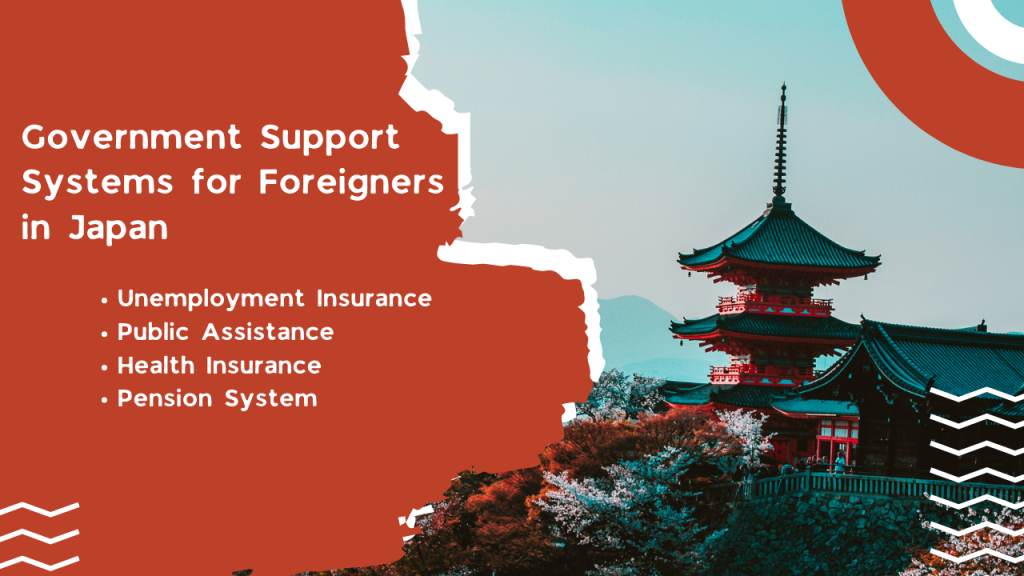Introduction:
Discover the comprehensive government support systems available to foreigners in Japan, offering vital assistance to those facing unemployment. In this guide, we outline the eligibility criteria and benefits of each program, while emphasizing the importance of understanding your visa status and individual circumstances. Let’s explore the support systems designed to provide financial aid and security during challenging times.
Government Support Systems in Unemployment Insurance:
Unforeseen circumstances can lead to job loss, and Japan’s Unemployment Insurance comes to the rescue. This insurance provides essential benefits to support job seekers, ensuring a stable life while actively seeking new employment opportunities. The coverage ranges from 50% to 80% of the pre-employment wage. To be eligible for Japanese unemployment insurance, you must meet the following criteria:

a) Actively Seeking Employment: Demonstrating a positive intention to find employment, despite leaving your previous job. b) Prior Insurance Beneficiary Status: In principle, having an insurance beneficiary status for 12 months or more over a span of 2 years before separation from employment. c) Special Cases: Individuals experiencing uncontrollable reasons for separation, such as bankruptcy or dismissal, may qualify with 6 months or more of prior insurance beneficiary status over one year.
Unemployment insurance serves as a safety net, helping individuals bridge the gap between jobs and maintain financial stability during job transitions. Whether you’ve left your job due to personal reasons or company-related issues, the system aims to support job seekers in finding new opportunities as quickly as possible.
Government Support Systems in Public Assistance:
For foreign residents facing financial hardship and lacking means of support, Japan’s “seikatsu hogo” or “seikatsu anzen hoshou” (public assistance) program is a lifeline. It offers essential financial aid to cover living expenses and ensure a basic standard of living. The program is divided into two areas:
a) Income Assistance for the Poor: Provides financial support to individuals and families with low income or no stable means of livelihood. b) Social Services and Assistance for Socially Disadvantaged Individuals: Offers support and services to socially disadvantaged individuals, such as single parents or those with disabilities.
To be eligible for public assistance, applicants are required to undergo a thorough assessment of their financial situation and demonstrate their need for financial aid. The government aims to provide comprehensive support, including access to education, healthcare, and social services, to help individuals regain self-sufficiency.
Government Support Systems in Health Insurance:
Healthcare is vital for all residents in Japan, including foreigners. The country offers a well-established healthcare system with two primary health insurance options: National Health Insurance (NHI) and Employee Health Insurance (Shakai Hoken).
National Health Insurance (NHI) is available for foreign residents who do not qualify for the Employee Health Insurance program due to their employment status. The NHI covers approximately 70% of the total medical costs, while the remaining 30% is the responsibility of the insured. To be eligible for NHI, individuals must register with their local municipal office and contribute to the insurance premium based on their income.
On the other hand, the Employee Health Insurance program is available for those who are employed by companies in Japan. The premiums are deducted from their salaries, and the coverage varies depending on the specific employer’s plan. When seeking medical treatment, insured individuals must present their health insurance card to avail of discounted payment options.
Government Support Systems in Pension System:
Planning for retirement is essential for everyone, including foreigners working in Japan. The National Pension system, administered by the Japan Pension Service, is a state pension program that provides retirement benefits to registered residents aged 20 to 59, including both Japanese citizens and legal foreign residents.
To be eligible for pension benefits, individuals must have lived and worked in Japan for a certain period and contributed to the pension system. The size of the pension depends on the amount of contributions made into the system. Upon reaching retirement age, individuals can claim their pension benefits, providing financial security during their golden years.
Even if a foreign resident had short periods of National Pension coverage, they may still be eligible to withdraw a lump sum from the system. To ensure the stability of the pension system, the Japanese government maintains the Government Pension Investment Fund, making investments designed to minimize risk.
Conclusion:
Understanding the various government support systems in Japan is crucial for foreign residents, particularly during times of unemployment. These support programs offer much-needed financial aid, access to healthcare, and retirement benefits to provide security and stability in challenging circumstances.
Eligibility requirements and the level of support provided may vary based on visa status, length of stay, and previous contributions to social insurance programs. If you find yourself unemployed, seek guidance from your local municipal office or Hello Work center to explore the specific support programs available to you. Empower yourself with the knowledge of these support systems to secure financial aid and stability during challenging times.
Follow us on :
Facebook : https://www.facebook.com/ABKAots.Thiruvanmiyur
Instagram : https://www.instagram.com/abkomrjapaneselanguageschool/
Linkedin : https://www.linkedin.com/company/abk-aots-dosokai-omr-japanese-languageschool/
Youtube: https://www.youtube.com/@avedjapaneselanguageschool3664


